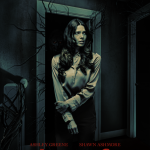Trying to leave their troubled lives behind, twin brothers return to their hometown to start again, only to discover that an even greater evil is waiting to welcome them back.
Chuck says:
There’s no shortage of ambition where Ryan Coogler’s “Sinners” is concerned, a social indictment masquerading as a period vampire movie. Set during the early 1930’s, the artistry on display is impressive, an incredible example of sumptuous production design and meticulously rendered costuming captured in comforting warm tones. If nothing else, the film is a visual delight, something you’re libel to pay close attention to during the first hour, a far-too long but necessary stretch of exposition that flirts with tedium. Coogler takes a very deliberate approach towards recreating the world of Black sharecroppers during the Great Depression before it morphs into something far more sinister.
Technical wizardry is at play from the start as Michael B. Jordan takes on the dual role of twins Smoke and Stack, outsized characters in the Mississippi town where they grew up. With a reputation for having worked with Al Capone, they’ve returned to apply what they’ve learned. Having purchased an abandoned sawmill, the brothers plan on opening a Juke joint, set among the cotton fields that seemingly stretch to the horizon.
However, each have a great deal of baggage that can no longer be ignored. Smoke is reunited with Annie (Wunmi Mosaku), who he once shared a child with that died in infancy. Meanwhile, Stack must contend with Mary (Hailee Steinfeld), who he grew up with and fell for, only to break her heart after he left.
In addition to those two being present for opening night of the brothers’ new enterprise is harmonica player Delta Slim (Delroy Lindo), angelic singer Pearline (Jayme Lawson), imposing bouncer Cornbread (Omar Benson Miller), Eastern marrieds Bo and Grace (Yao, Li Jun Li), and Sammie (Miles Caton), Smoke and Stack’s cousin who’s a wizard on the Dobro guitar. His music, as well as Annie’s cooking, brings in folks from miles around.
The throbbing energy emanating from the place also attracts a trio of white musicians (Peter Dreimanis, Lola Kirke and Nathaniel Arcand) who ask for entry into the club but are denied. They are not what they seem.
You’ll be hard pressed to find a better-looking film this year. Production designer Hannah Beachler meticulously recreates the period details, getting an assist from Oscar-winning costume designer Ruth E. Carter. They help create an immersive experience that’s made complete by Coogler’s ever-moving camera, which repeatedly drifts through these richly drawn spaces. Whether it’s an impressive tracking shot that travels across a busy street from one crowded store to another and back again, or a tour de force moment that takes the viewer on a trip back and forth through time, “Sinners” proves to be an impressive cinematic experience.
These elements keep us enraptured though Coogler’s script at times seemingly dares us to become disengaged. The first hour takes far too much time introducing the vast cast of characters and their intertwined pasts. Throughout, there are scenes run too long and could have been executed more efficiently. Equally excessive is a third act bacchanal of violence that, while cathartic, is wholly unnecessary. There’s a sense of narrative flab throughout that prevents the film from having the punch Coogler intends.
That being said, there’s no denying the potent nature of the film’s theme. Once the secret of the trio of musicians is revealed, the story’s tone radically changes, its politics becoming more pointed. And while the metaphor Coogler uses is obvious, it’s still effective as “Sinners” pulls no punches in examining past abuses that continue to plague the Black community. The director attacks these issues with a viciousness that’s palpable, an effective approach that trumps the script’s flaws.
3 Stars




